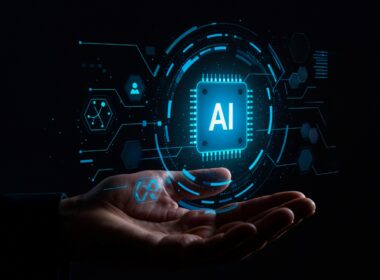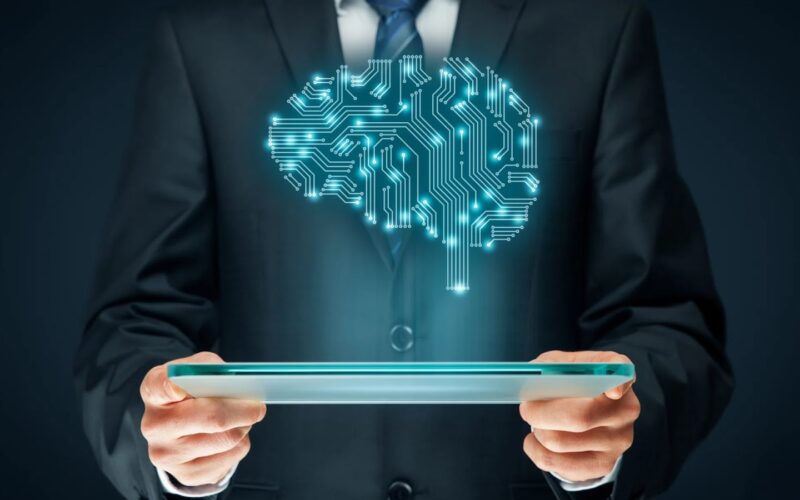You’re facing pressure to deliver faster, more accurate care, and at a lower cost. Healthcare systems worldwide are grappling with increasing patient numbers, rising costs, and the need for improved outcomes. How do you address these challenges without compromising the quality of care?
Artificial intelligence (AI) is your answer. AI in healthcare is already making a significant difference. By streamlining diagnostic processes, improving patient outcomes, and increasing operational efficiency, AI is reshaping the way healthcare organizations work.
From early disease detection to personalized treatment plans, AI can help you tackle some of healthcare’s most pressing issues.
If you’re ready to explore how AI can improve your healthcare services and drive better results, keep reading. Discover how you can use AI for better diagnostics, patient care, and efficiency.
Key Takeaways
- AI is revolutionizing healthcare by enhancing diagnostic accuracy, enabling personalized treatments, and improving operational efficiency.
- Key uses of AI in healthcare include diagnostics, personalized medicine, virtual assistants, and drug discovery, each transforming patient care and treatment outcomes.
- AI brings significant benefits such as improved patient outcomes, reduced healthcare costs, and enhanced operational efficiency—resulting in better care and resource management.
- Real examples show AI in action, from AI-powered cancer detection (Google Health) to faster drug discovery (BenevolentAI), demonstrating tangible results and industry impact.
- Challenges like data privacy, regulatory hurdles, and integration issues can be overcome with the right strategies, ensuring successful AI adoption in healthcare.
The Growing Role of AI in Healthcare
You’ve likely heard that AI is making waves across various industries, but what does that mean for healthcare specifically?
The global AI in healthcare market size was estimated at USD 26.57 billion in 2024 and is projected to reach USD 187.69 billion by 2030, growing at a CAGR of 38.62% from 2025 to 2030.
This explosive growth is driven by increasing demand for personalized medicine, advancements in diagnostic technology, and the need for improved operational efficiency.
Let’s get into some of the most impactful applications of AI that are improving healthcare delivery today.
Key Uses of AI in Healthcare
AI is not a one-size-fits-all solution; its versatility means it can be applied in various areas of healthcare, improving outcomes and efficiency. Let’s explore some of the most impactful uses of AI in the healthcare industry:
1. Diagnostics and Predictive Analytics
AI is transforming the way healthcare providers diagnose and predict diseases. By analyzing massive datasets, including patient records, medical imaging, and genetic information, AI can help identify patterns and diagnose conditions earlier, often with greater accuracy than human doctors.
- How it works: AI models, such as deep learning frameworks, are trained to recognize patterns in medical images, like X-rays and MRIs, or analyze data from lab results.
Once trained, these models can detect abnormalities or early-stage diseases like cancer, heart disease, and neurological conditions.
2. Personalized Medicine
AI is helping to make medicine more personalized by considering a patient’s genetic information, lifestyle, and medical history to craft individualized treatment plans.
- How it works: By analyzing genetic data through genomic sequencing and incorporating a patient’s personal health data, AI can recommend more effective treatments tailored to each individual’s specific condition.
3. Virtual Health Assistants
AI-powered virtual assistants are changing how patients interact with healthcare providers. These systems utilize NLP to comprehend patient inquiries, provide medical advice, and schedule appointments in real-time.
- How it works: Virtual assistants use NLP algorithms to analyze patient queries and respond with relevant health information or actions.
These AI systems are designed to help patients manage their conditions, track medication, or even provide virtual consultations for non-emergency situations.
4. Drug Discovery and Development
Developing new drugs is a time-consuming and expensive process, often taking years or even decades to bring a drug to market. AI is speeding up this process by predicting how different compounds will interact with the body and identifying potential candidates for new medications.
- How it works: AI algorithms use machine learning models to analyze vast datasets of chemical compounds and biological information.
These models can predict which compounds are most likely to succeed in clinical trials, allowing researchers to focus on the most promising candidates.
For more insights on how AI is being applied in healthcare systems and medicine, check out our blog on Artificial Intelligence Transforming Medicine and Healthcare.
Now that we’ve explored how AI is being used in healthcare, let’s take a closer look at the real benefits it brings.
Benefits of AI in Healthcare
AI is more than just a technological advancement. By streamlining processes, reducing errors, and offering more accurate predictions, AI provides a host of benefits that significantly improve both patient care and the business side of healthcare operations.
1. Improved Patient Outcomes
By using AI to analyze patient data, doctors can receive real-time insights and make more informed decisions. Predictive models can anticipate potential complications or detect disease progression before it becomes severe.
2. Cost Efficiency and Time Savings
From automating patient intake processes to optimizing supply chain management, AI can handle repetitive administrative tasks, cutting down on the time required for healthcare providers to process claims, schedule appointments, and manage inventory.
3. Enhanced Operational Efficiency
AI solutions analyze real-time data to help healthcare providers optimize schedules, predict patient flow, and allocate resources where they’re most needed. For example, AI tools can predict when patient volumes will spike, allowing facilities to prepare accordingly.
4. Accessibility to Healthcare
AI-based telehealth platforms enable patients to connect remotely with healthcare providers. These platforms utilize AI to assess symptoms, offer consultations, and even suggest next steps in care, all without requiring an in-person visit.
Looking to enhance patient care and streamline operations? Codewave’s Healthcare Mobile App Development Services provide secure and user-friendly apps to improve patient engagement and simplify healthcare management.
The theory is compelling, but the results speak for themselves. Furthermore, let’s examine some practical examples where AI has been successfully implemented.
Case Studies and Real-World Applications
AI is already delivering results. Let’s explore a few real-world examples where AI has been successfully implemented, showcasing the tangible impact it’s having across the industry.
Case Study 1: AI in Cancer Diagnosis (Google Health)
One of the most well-known applications of AI in healthcare is its use in cancer diagnosis, specifically breast cancer detection. Google Health’s AI system has demonstrated remarkable accuracy in detecting signs of breast cancer in mammograms.
- Impact: By improving diagnostic accuracy, Google Health’s AI system can help detect cancer in its earliest stages, when it is most treatable, ultimately saving lives. Early diagnosis can lead to better patient outcomes and more effective treatment options.
Case Study 2: AI in Drug Discovery (BenevolentAI)
The process of discovering and developing new drugs is notoriously long and costly, often taking years and billions of dollars to bring a drug to market. AI is helping speed up this process. BenevolentAI, a biotech company, utilized AI to identify a potential treatment for COVID-19 within a few months.
- Impact: By utilizing AI for drug discovery, BenevolentAI accelerated the development of a potential COVID-19 treatment, drastically reducing time-to-market and increasing the chances of finding practical solutions more quickly.
Case Study 3: AI in Virtual Health Assistants (Babylon Health)
Babylon Health is a global leader in AI-powered healthcare. It utilizes AI-powered virtual assistants to offer 24/7 health consultations via an AI chatbot, which evaluates symptoms and recommends potential treatments based on medical data.
- Impact: Babylon Health’s virtual assistant has provided cost-effective access to healthcare for millions, particularly in areas with limited access to medical professionals. It enables users to consult with a virtual healthcare provider from the comfort of their own homes.
These case studies provide objective evidence of how AI can address critical challenges, enhance patient care, and improve operational efficiency.
Struggling with customer engagement? Codewave’s AI Video Chatbot Services offer personalized, real-time support to enhance customer experience and streamline communication. Get faster response times and improve customer satisfaction!
Despite its potential, adopting AI in healthcare presents its own challenges. Let’s address the common hurdles and offer practical strategies to help healthcare providers successfully integrate AI into their operations.
Overcoming Challenges in AI Adoption in Healthcare
While AI presents tremendous opportunities for the healthcare industry, its adoption isn’t without challenges. Healthcare providers must overcome several hurdles to integrate AI into their systems fully.
Let’s examine the most common challenges and explore ways to overcome them.
1. Data Privacy and Security Concerns
AI models often require vast amounts of patient data to function effectively. Ensuring that this data is securely stored, processed, and transmitted is a significant concern.
- Solution: To mitigate these risks, healthcare organizations must implement robust data encryption, anonymization techniques, and ensure AI tools are compliant with industry regulations.
Blockchain technology is one potential solution to enhance data security, offering a decentralized, transparent, and tamper-proof way to manage sensitive patient data.
2. Regulatory Hurdles
Navigating the complex regulatory landscape and ensuring AI systems are FDA-approved or compliant with other local healthcare regulations can be time-consuming and costly.
- Solution: Healthcare providers should work closely with regulatory bodies early in the development process. They must ensure AI tools undergo clinical validation, have transparent algorithms, and provide explainability to guarantee compliance and gain trust from both regulators and patients.
3. Trust and Training
Healthcare professionals may be skeptical of AI’s ability to deliver accurate, unbiased, and reliable results, especially in critical situations. Additionally, integrating AI into healthcare workflows requires proper training and upskilling of staff.
- Solution: Building trust requires demonstrating the reliability and accuracy of AI systems through clinical trials, peer-reviewed studies, and real-world evidence. Healthcare providers must also offer ongoing training and support to ensure professionals feel comfortable using AI tools alongside their own expertise.
4. Integration with Existing Systems
Another significant hurdle is integrating AI solutions with legacy systems already in place at healthcare organizations. Legacy systems may not be compatible with AI tools, leading to inefficiencies, data silos, and disruptions in workflows.
- Solution: Healthcare organizations should prioritize interoperability when selecting AI tools, ensuring that these solutions can seamlessly integrate with existing electronic health records (EHR) systems and other healthcare technologies.
Cloud platforms like Microsoft Azure Health offer tools specifically designed to integrate AI with existing systems, allowing healthcare providers to modernize their infrastructure while improving patient care.
Now that we’ve explored the transformative impact of AI in healthcare, it’s clear that AI isn’t just a passing trend; it’s shaping the future of healthcare delivery.
However, with numerous AI tools and technologies available, the next step is determining how to effectively implement these solutions and align them with your business goals.
That’s where Codewave comes in.
Why Codewave is Your Ideal Partner in Implementing AI in Healthcare?
To fully capitalize on AI’s potential, it’s crucial to integrate the right systems, tools, and frameworks that enhance patient outcomes, streamline operations, and reduce costs.
At Codewave, we specialize in designing AI-driven solutions tailored to meet the unique needs of your healthcare organization. Whether you’re looking to implement predictive analytics, improve diagnostics, or optimize your workflow, our expert team ensures a smooth, successful deployment.
Here’s why Codewave should be your partner in this transformation:
- Customized AI Solutions: We don’t offer one-size-fits-all tools. We tailor AI systems to meet your specific healthcare goals, ensuring that the technology aligns with your needs.
- Scalable & Future-Proof: Our solutions grow with your business. As your organization evolves, our AI systems adapt to keep you ahead of the curve.
- Seamless Integration: Whether you’re looking to integrate AI with your existing infrastructure or start fresh, we ensure a smooth, hassle-free implementation.
- Real Results: With a proven track record of successful AI implementations in healthcare, Codewave delivers systems that drive tangible results, improving efficiency, reducing costs, and enhancing patient care.
If you’re ready to take the next step and unlock the power of AI to improve your healthcare operations, Codewave is here to guide you through every stage of the journey.
Get a free AI strategy session with our experts.
[Book Free Consultation]
FAQs
1. How is AI currently being used in healthcare?
AI is enhancing diagnostics, personalizing treatment plans, and streamlining administrative tasks. Applications include AI-powered imaging for early disease detection, virtual health assistants for patient engagement, and automated medical transcription to reduce clinician workload.
2. What are the main benefits of AI in healthcare?
AI improves diagnostic accuracy, enables personalized treatments, reduces operational costs, and enhances patient outcomes. For instance, AI tools can predict disease progression and assist in clinical decision-making, leading to more effective care.
3. What challenges exist in implementing AI in healthcare?
Key challenges include data privacy concerns, integration with existing systems, and the need for regulatory compliance. Ensuring transparency and fairness in AI algorithms is crucial for maintaining trust and equity in healthcare delivery.
4. Can AI replace human doctors in healthcare?
AI is a tool to assist healthcare professionals, not replace them. While AI can analyze data and suggest treatment options, human expertise is essential for making final decisions and providing compassionate care.
5. How can healthcare organizations overcome AI adoption challenges?
Organizations can address challenges by investing in secure data infrastructure, ensuring compliance with regulations, and providing training for staff. Collaborating with technology partners and adopting scalable AI solutions can also facilitate smoother integration into existing workflows.
Codewave is a UX first design thinking & digital transformation services company, designing & engineering innovative mobile apps, cloud, & edge solutions.







